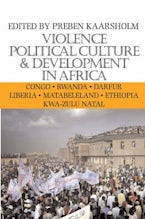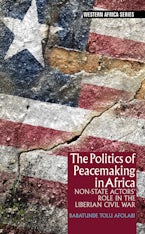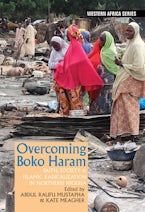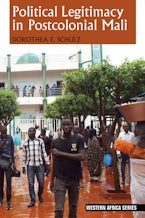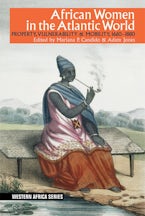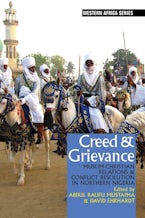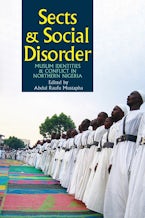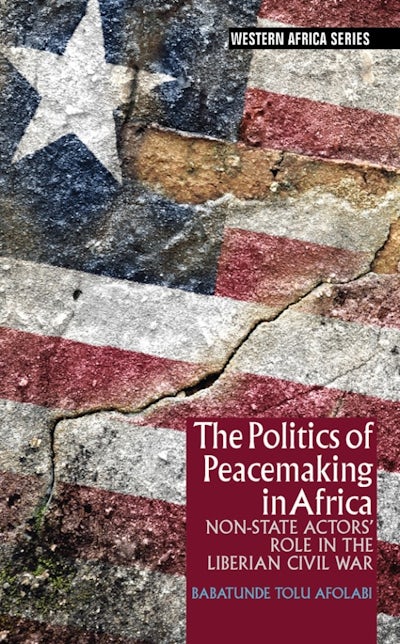
Title Details
215 Pages
23.4 x 15.6 cm
Series: Western Africa Series
Series Vol. Number:
9
Imprint: James Currey
The Politics of Peacemaking in Africa (African Edition)
Non-State Actors' Role in the Liberian Civil War
- Description
- Contents
- Reviews
PAPERBACK FOR SALE IN AFRICA ONLY
A detailed examination of the role of two critical non-state groups in the Liberian Civil War peace process - the diaspora and the religious - that provides key insights for policymakersand NGOS into the roles that civil society actors can play in conflict resolution and peacemaking.
FOR SALE IN AFRICA ONLY
'throws light on the role of several key agents in bringing to an end one of the darkest episodes in post-independence African history.' Ebenezer Obadare, University of Kansas
'Providesa solid overview and analysis of the neglected role of faith communities and the diaspora in helping to bring an end to the brutal Liberian civil war. ... clearly demonstrates just how important non-state actors were to the peaceprocess. The book will no doubt contribute to our understanding of peacemaking and to the political and social dynamics inherent in such enterprises.' Ian Taylor, Professor in International Relations and African Political Economy,St Andrews University Until the 1990s, conflict resolution and peacemaking fell to states, the UN and other intergovernmental organizations. In recent times it is non-armed, non-state actors who have had a pivotal role in seeking to resolve civil wars in Africa. This book examines, for the first time, through an examination of the Liberian Civil War in particular, how non-state actors have impacted upon peace processes.
The Liberian Civil War wasthe first post-Cold War intra-state conflict in West Africa and exemplified the "new wars" breaking out on the continent. The peace process that followed showed how future peacemaking processes might evolve, being not only the first in which a regional economic grouping had a role - in this case ECOWAS - but also involving non-state religious and diaspora actors.
Religious actors, initiators of the Liberian peace process, were mediators, dialogue facilitators, watchdogs and trustees of the entire peace process. Although their efforts were mainly influenced by the desire to fulfil the divine mandate to "tend to the flock", they were also able to regain some of the societal influence that organized religion, especially Christianity, enjoyed during the 158 years of minority Americo-Liberian rule. Diaspora actors' roles ranged from being founders and sponsors of warring factions to providing succour to Liberians back home through remittances and engaging in the peace process.
Babatunde T. Afolabi is a Senior Programme Manager at the Centre for Humanitarian Dialogue (HD). He had previously worked at the ECOWAS Commissionwhere he was involved in peace processes across West Africa.
A detailed examination of the role of two critical non-state groups in the Liberian Civil War peace process - the diaspora and the religious - that provides key insights for policymakersand NGOS into the roles that civil society actors can play in conflict resolution and peacemaking.
FOR SALE IN AFRICA ONLY
'throws light on the role of several key agents in bringing to an end one of the darkest episodes in post-independence African history.' Ebenezer Obadare, University of Kansas
'Providesa solid overview and analysis of the neglected role of faith communities and the diaspora in helping to bring an end to the brutal Liberian civil war. ... clearly demonstrates just how important non-state actors were to the peaceprocess. The book will no doubt contribute to our understanding of peacemaking and to the political and social dynamics inherent in such enterprises.' Ian Taylor, Professor in International Relations and African Political Economy,St Andrews University Until the 1990s, conflict resolution and peacemaking fell to states, the UN and other intergovernmental organizations. In recent times it is non-armed, non-state actors who have had a pivotal role in seeking to resolve civil wars in Africa. This book examines, for the first time, through an examination of the Liberian Civil War in particular, how non-state actors have impacted upon peace processes.
The Liberian Civil War wasthe first post-Cold War intra-state conflict in West Africa and exemplified the "new wars" breaking out on the continent. The peace process that followed showed how future peacemaking processes might evolve, being not only the first in which a regional economic grouping had a role - in this case ECOWAS - but also involving non-state religious and diaspora actors.
Religious actors, initiators of the Liberian peace process, were mediators, dialogue facilitators, watchdogs and trustees of the entire peace process. Although their efforts were mainly influenced by the desire to fulfil the divine mandate to "tend to the flock", they were also able to regain some of the societal influence that organized religion, especially Christianity, enjoyed during the 158 years of minority Americo-Liberian rule. Diaspora actors' roles ranged from being founders and sponsors of warring factions to providing succour to Liberians back home through remittances and engaging in the peace process.
Babatunde T. Afolabi is a Senior Programme Manager at the Centre for Humanitarian Dialogue (HD). He had previously worked at the ECOWAS Commissionwhere he was involved in peace processes across West Africa.
Introduction: The Politics of Diaspora Groups' Involvement in the Liberian Peace Processes
Civil Society and its Engagement with the Liberian Peace Process
Liberia's Evolution and the Descent into Civil War
The Liberian Civil War: Interests, Actors and Interventions
Religious Actors and the Peace Process
The Diaspora and the Manifestation of Interests during the Peace Process
Conclusion
Civil Society and its Engagement with the Liberian Peace Process
Liberia's Evolution and the Descent into Civil War
The Liberian Civil War: Interests, Actors and Interventions
Religious Actors and the Peace Process
The Diaspora and the Manifestation of Interests during the Peace Process
Conclusion
"[P]rovides a rich literature on the role of civil society in peacekeeping that could provide valuable lesson on how civil society can play a pivotal role in the re-engineering of societies and polity as is the case of Liberia. I recommend this book to students and academics who are interested in the nature of peacemaking in developing states and to policy analysts and other practitioners who are engaged in projects that are related to the role of non-state actors in conflict resolution and peacekeeping in Africa." AFRICAN STUDIES QUARTERLY
Title Details
215 Pages
2.34 x 1.56 cm
Series: Western Africa Series
Series Vol. Number:
9
Imprint: James Currey




